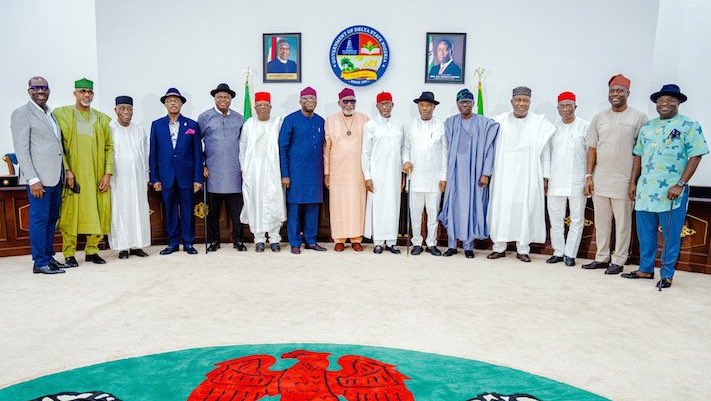Southern governors’ Asaba declaration
Governors of 17 states in the South-West, South-East and South-South met in Asaba, Delta State last week behind closed doors, but publicly declared a 12-point resolution. In the context of the whirlwind of violence sweeping through the South-East and South-South, the destruction of security infrastructure and the unyielding posture of separatist agitators, the southern governors’ […]

Southern governors at the end of their security meeting held at the Delta State Government House yesterday.
Photo: Govt House Enugu
Governors of 17 states in the South-West, South-East and South-South met in Asaba, Delta State last week behind closed doors, but publicly declared a 12-point resolution. In the context of the whirlwind of violence sweeping through the South-East and South-South, the destruction of security infrastructure and the unyielding posture of separatist agitators, the southern governors’ meeting generated a lot of interest.
Perhaps, the first declaration was a source of consolation to those who feared that the country would split in the deafening alarm being raised in both traditional and social media. The governors’ resolution read otherwise, saying they “Affirmed that the peoples of Southern Nigeria remain committed to the unity of Nigeria on the basis of justice, fairness, equity and oneness, and peaceful co-existence between and among its peoples with a focus on the attainment of shared goals for economic development and prosperity”.
- El-Rufai, Labour set for showdown as workers ground Kaduna tomorrow
- Rail track vandalism: Police arrest 5 suspects in Kaduna
In line with the loud outcry from North to South, the governors’ emerged with a populist resolution that says they “Observed that the incursion of armed herders, criminals, and bandits into the southern part of the country has presented a severe security challenge such that citizens are not able to live their normal lives including pursuing various productive activities leading to a threat to food supply and general security. Consequently, the meeting resolved that open grazing of cattle be banned across southern Nigeria.”
A critical appraisal of these resolutions reveals that the governors were unwilling to take responsibility for the security challenges. They passed the buck to the federal government. The governors ought to have come up with practical steps in dealing with the current difficult situation. Buck-passing cannot take the country to the Promised Land. It was astonishing to discover that the governors did not declare what role the regional security outfits they have set up should play in tackling non-state actors that have held their people hostage or prevented them from engaging in farming and other legitimate business activities.
It was also disappointing that the governors were silent on the activities of the Indigenous People of Biafra (IPOB) and attacks on security formations, especially the killing of policemen and soldiers in the region.
This is highly condemnable. The governors must wake up from their slumber and tackle the challenges by collaborating with the federal government and governors from other parts of the country. They must note that not much success will be recorded if they appear to be supporting secessionist groups.
Like many opinion leaders have suggested, the southern governors have re-echoed the call for national dialogue, saying they “Recommended that in view of widespread agitations among our various peoples for greater inclusiveness in existing governance arrangements, the federal government should convoke a national dialogue as a matter of urgency.” This is a crucial suggestion. It presupposes that the governors are not satisfied with the role being played by the National Assembly, a supposed representatives of the people, in the midst of the chaos in Nigeria. Members of the National Assembly have demonstrated such docility that they are not taken seriously by the Executive at the federal level and even state governors. With an effective legislature, there should be no need for a national conference.
However, we urge the governors to go beyond the declaration by taking the issues raised at Asaba to the National Security Council meeting. It is feared that at such meetings governors, in an attempt to be politically correct, fail to frankly tackle vital issues, but return to their regional bodies to make populist statements. This does not do the country any good.
We also call on the president to attend to these recommendations. For instance, the governors “recommended that the federal government should support willing states to develop alternative and modern livestock management systems.” In the last six years, the Buhari government has failed to implement the much talked about livestock transformation policy, which could have ameliorated the conflict. It is time to take pragmatic steps in this direction. Also the governors “recommended that in deference to the sensitivities of our various peoples, there is a need to review appointments into federal government agencies (including security agencies) to reflect federal character as Nigeria’s overall population is heterogeneous.” This, too, is apt. We add that it is time for service chiefs to mobilise the armed forces to take the fight to terrorists and bandits in Nigeria’s forests. This singular step could turn the tide against our common enemies and change the negative mood of agitation in the country.
